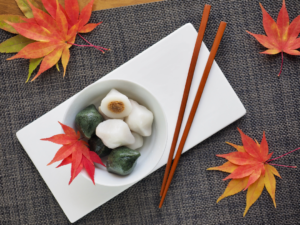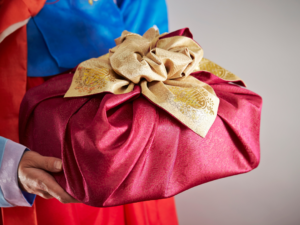Every country in the world has its special celebration, whether it is Independence Day, Flag Day, or Thanksgiving. It’s the time of the year when families reunite, and bonds become stronger. South Korea has many similar celebrations such as Seollal, Hangul Day, and Liberation Day. But today, we will delve into the unique and enchanting Chuseok celebration, a family-oriented harvest festival that sets South Korea apart with its unique traditions and customs.
What is Chuseok?

Chuseok, also known as Hangawi, is one of Korea’s most cherished holidays, often called the “Korean Thanksgiving.” Translated as “Autumn Evening,” this three-day celebration is a time for family reunions, ancestral rituals, and sharing the fruits of the harvest. Falling on the 15th day of the 8th month in the lunar calendar, Chuseok is typically celebrated in September or October. In 2024, mark your calendars from September 16th to 18th for this special occasion.
During Chuseok, Koreans return to their ancestral hometowns to honor family traditions and reconnect with loved ones. It’s a time of joy, reunions, and rich cultural practices.
Famous dishes
Chuseok is a time for savoring an array of traditional Korean dishes, each offering its own unique flavors and textures. The star of the holiday is undoubtedly songpyeon — a rice cake. Made from finely ground rice dough, songpyeon is hand-shaped and steamed to perfection, with each family adding their own twist to the recipe by filling it with ingredients like sesame seeds, honey, or sweet red beans.
But Chuseok’s culinary delights don’t end there. Families also prepare other popular dishes, such as japchae (stir-fried glass noodles with vegetables), jeon (crispy pan-fried pancakes), and galbi-jjim (tender braised beef short ribs). These traditional foods, with their vibrant flavors and comforting flavors, are essential to the rich and joyful dining experience that defines Chuseok.
Traditions

On the morning of Chuseok, families gather for Charye, a sacred memorial service to honor their ancestors. This heartfelt tradition, central to Chuseok, reflects the deep respect for family and heritage that lies at the core of Korean culture. As part of the custom, it is also common for families to visit ancestral graves to tidy the surroundings by plucking weeds, symbolizing both care and remembrance.
One of the more modern but beloved Chuseok traditions is the exchange of gifts, with canned Spam standing out as an unexpected favorite. In addition to Spam, other popular Chuseok gifts include fruit baskets, meat sets, and more special and premium Korean goods, for instance canned luncheon meat, which is both delicious and valuable.
As Chuseok draws near, we encourage you to take the opportunity to gather with your loved ones, share heartfelt moments, and indulge in the traditional foods that embody the warmth and spirit of this treasured Korean holiday. May your celebrations be filled with joy, gratitude, and the rich flavors of this special time, strengthening the bonds of love and kinship. Whether you’re in South Korea or abroad, Chuseok is a wonderful time to connect with Korean culture and traditions.
Follow our Instagram page to learn more about South Korea and share your cultural experience with the delicious Jongga products!
Source:
- https://asiasociety.org/korea/chuseok-korean-thanksgiving-day
- https://www.90daykorean.com/chuseok-in-korea
- https://kimchimari.com/how-to-make-songpyeon-for-chuseok
- https://www.hormelfoods.com/newsroom/news/why-cans-of-spam-are-a-popular-gift-for-chuseok-the-korean-thanksgiving


